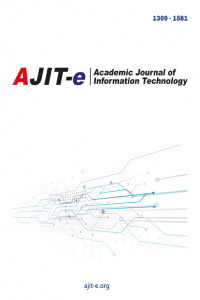An Adaptive Normative Multi Agent System using Web 3.0 for e-Learning Platform
e-Learning, Norms, Activity Theory, Semantic Web
An Adaptive Normative Multi Agent System using Web 3.0 for e-Learning Platform
e-Learning, Norms, Activity Theory, Semantic Web,
___
- Keegan, D.(1996), “Foundations of Distance Education”, 3rd edn, London: Routledge Press.
- Bricken, W. (1990). Learning in virtual reality. Seattle, WA: Human Interface Technology Laboratory Technical Report HITL‐M‐90‐5.
- Karlsey,G. & Shneiderman, B. (1998). Engagement theory: A framework for technology‐based teaching and learning. Educational Technology, 38(5), 20‐23.
- Hayes, Gary.(2006) ʺVirtual Worlds, Web 3.0 and Portable Profiles.ʺ Personalize Media .
- Vygotsky. L (1978), “Mind and Society”, Cambridge MA, Harvard University Press.
- Engeström, Yrjö.(2001) ʺExpansive learning at work: Toward an activity theoretical reconceptualization.ʺ Journal of education and work 14.1: 133‐156.
- Mwanza, Daisy, and Yrjö Engeström (2005), ʺManaging content in E‐learning environments.ʺ British Journal of Educational Technology 36.3, pp. 453‐463.
- Savarimuthu, Bastin Tony Roy, and Stephen Cranefield (2011) ʺNorm creation, spreading and emergence: A survey of simulation models of norms in multi‐agent systems.ʺ Multiagent and Grid Systems 7.1: 21‐54.
- Chrisholm, Roderick.M(1963), “Contrary to Duty Impeartives and Deontic Logic”, Analysis,33‐36
- Brewka, Grchard (1989), “Non‐Monotonic Logics: A Brief Overview”, AI Communications: The European Journal of Artificial Intelligence, 88‐97.
- Brown Mark A (1996), “Deontic Logic, Agency, and Normative Systems”, New York, Springer Verlag.
- Guido Boella, Gabriella, Pigozzi and Leenderf, Toore, (2009) “NormativeFramework System Change”, Proceedings of 8th International Conference on Autonomous Agents and Multi Agent System”.
- Jan Aasman, “Activity Recognition using a Web 3.0 Database”, IEEE Computer Society, pp. 90‐93.
- Mathew J.Hoffman (2000),” Exploring Norm Emergence and Evolution: An Investigation with Agent Based Models”, Annual Meeting of the Political Science Association, Washington DC, Poster Session.
- Namrata Dhanda, Manuj Darbari, Neelu J Ahuja (2012) “Development of Multi Agent Activity Theory (MATeL) Framework Focussing on Indian Scenario”, International Review on Computers and Software, Vol 7, No.4, pp. 1624‐1628.
- Xion Hui‐Xang, Su Ying,(2010) “Study of Optimization of Personalised e‐Learning system based on Web 3.0M”, 2nd IEEE International Conferenceon Future Computer Communication, Vol 2, May.
- Yayın Aralığı: Yılda 4 Sayı
- Başlangıç: 2010
- Yayıncı: Akademik Bilişim Araştırmaları Derneği
Aylin TUTGUN ÜNAL, Faruk İNAN, Mehmet Tuğrul KAYA, Murat FIRAT, Zuhal GÜZELBABA, Aylin BAHADIR
An Adaptive Normative Multi Agent System using Web 3.0 for e-Learning Platform
Namrata DHANDA, Manuj DARBARİ, Neelu Jyoti AHUJA, .ımran Ali SİDDİQU
Tıpta 3 Moleküler Yapının Geleceği
Nesibe YALÇIN, Esra ÇOBAN, Sevgi ARI
Türkiyede Uzaktan Afet Eğitimi Web Değerlendirmesi
